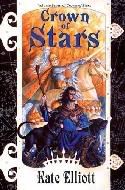
This is an interesting review in that half of what I find disappointing about this novel, I'm not sure whether it's because they were oversights on the author's part, or because I've forgotten something that's happened in previous books. It's been a while since I read the first five books of the Crown of Stars series, I remember the main plot points, but some of the tinier details do continue to escape me.
Either way, here goes - and as a warning: if you haven't read the first five books, go out and do so before reading this review, or else read on and be spoiled, or confused, because I don't have the space to explain every last detail to newcomers.
Anyhoo - continuing on. In the final novel, things come to a head. Sanglant and his army, Conrad and Sabella and their army, Stronghand and his warband, the evil Hugh of Austra all come to meet by the city of Kassel. Battle will be joined, and at long last the throne of Wendar will be decided. Allow me to list the things that disappointed me in this book:
1. What happened to the elf-like Ashioi? Under the banner of the new, warlike Feather Cloak (who happens to be Sanglant's mother), they have decided to wage a war of annihilation against mankind in retribution for all that they have suffered over the centuries. The Church of mankind doesn't like the Ashioi any better. However, after one Ashioi warcamp is decimated by Hugh's weather spells, their rampage is cut short. No more war parties, no more attacking with poisoned arrows and attempting to blame it on King Sanglant. I couldn't understand what made it stop so suddenly.
2. What happens to Queen Adelheid? She married Henry, plotted to have him controlled by a daimone (with Hugh's help), then moved to the background after Henry died and Sanglant claimed the crown. In the first half of the book, she's plotting to gather forces to her aid in order to press her claim and the claim of her children, but after she and her new husband kill the Biscop Antonia (which is, by the way = YAY!), she also abruptly vanishes as a threat.
3. A lot of the revelations that people have have no corporeal proof to support them, and are imparted by visions that, to me, seemed out of the blue. For instance, the idea of the Phoenix, of their religion's Redemption of Daisane (aka Jesus), is decided to be th real thing, without so large a religious debate, even though there's not a lot of proof on it. Same thing for the creatures - like lions - that just drop random objects at certain characters' feet, giving them visions about the truth about their ancestry or some such tidbid of information.
4. We never find out who, or what, Alain is. He's something special - perhaps even supernatural, given the way people react to him. He begins as a flawed, but pure-hearted character, but merges in these last two books into a kind of resigned, sad saint. The end of the book suggests that he spends his days wandering around like a kind of medieval superhero, righting wrongs and fighting injustice with kindness. Hmmm...also - the concept that the Lady of Battles (who started Alain on his journey in the first place) turns out to be Satan came WAY out of the blue for me. I thought she was a good guy! When did that change?
Still, the ending wasn't completely unsatisfactory. Happy endings were doled out all around, and the final chapter jumps ahead an astonishing forty years to show us a brief glimpse of how the children and grandchildren of the main characters are getting by in the new world order. The characters are the reason this book didn't get a C. Kate Elliott rights really well, and I enjoyed reading the book despite the number of questions and loose ends I was left with.
No comments:
Post a Comment